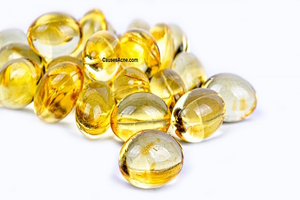
Is Vitamin-D Good For Acne?
Incredibly, it is estimated that over 75% of people in the United States do not ingest or create adequate amounts of vitamin D. Some people who are at greater risk of vitamin D deficiency are people who are obese, elderly and sufferers of fat malabsorption syndromes and inflammatory bowel diseases such as cystic fibrosis and Crohn’s disease.
Vitamin D is required to be healthy and there is a lot of talk about how vitamin D can help manage or even cure acne. Keep reading to discover the facts about how vitamin D helps acne, the best way to get it and how much you need daily to achieve optimal health.
What Does Vitamin D Do?
While too little and too much of this vitamin is bad for your health, the right amount creates and maintains strong bones and teeth. It may also help with your immune system function as well as lower your risk of dementia and cancer.
Proper levels of vitamin D are also thought to help treat infections which might be one of the reasons why people use it to reduce their acne. It is also considered by some to be a solution to S.A.D. (Seasonal Affective Disorder).
There is actually quite a bit of controversy as to the effects of low and high vitamin D levels in the scientific community and it remains an active subject with studies being conducted every day.
How Does Vitamin-D Fight Acne?
In 2008, a study conducted by Dr. Richard Gallo in the Division of Dermatology at the UCSD School of Medicine confirmed that vitamin D has a major part in your skin’s metabolism. Without going into too much scientific detail as to how vitamin D may improve acne, it helps to support the creation of certain beneficial chemicals that act as a natural barrier against infection.
Inflammatory acne is essentially an active infection, so people who take the recommended amount of vitamin D per day could very well improve their skin to the point of reducing or eliminating not only acne but also the scars they can leave behind. Their skin could also heal faster which means new acne goes away more rapidly than without vitamin D.
How Do I Get Vitamin D?
Vitamin D is either consumed through food or made by the body after exposure to sunlight. 10 minutes of sun exposure on most of your body per day should be enough to prevent vitamin-D deficiency.
Unfortunately, good amounts of vitamin D are not found in very many foods. The better sources would be eggs, fortified cereal, fish and milk. However, if you suffer from acne, you should not drink milk that contains iodine as it has been linked to aggravate acne.
Sunlight that has passed through a window will not contain vitamin D. Cloudy days will have less effect on your production of vitamin D and darker skinned people will not create as much as a lighter skinned person would in the same amount of light.
With hundreds of millions of people working and living inside buildings combined with the knowledge that exposure to the sun can raise your risk of skin cancer, getting vitamin D from the sun every day is not an option for most people and many choose to take vitamin D3 supplements instead.
What Happens If I Don’t Get Enough Vitamin D?
Vitamin D deficiency can lead your body to function in a sluggish manner. Over a long period of time, you will increase your risk of osteoporosis. Children who do not get enough vitamin D while they are growing may get a disorder called rickets which means their bones are weaker and softer than they should be.
What Happens If I Take Too Much?
Too much vitamin D is toxic and can cause hypervitaminosis D. Symptoms can include muscle weakness, fatigue, vomiting, nausea and constipation. The effects could cause calcification of your tissues, bones, kidney and heart along with high blood pressure and kidney stones.
Fortunately, it is not possible for our body to make toxic levels of vitamin D when exposed to the sun. Read on to see how much is safe for you.
How Much Vitamin D Do I Need Every Day?
According to the Institute of Medicine, the recommended amount of vitamin D that healthy people between 1 to 70 years old is 600 IU a day. For ages 9 to 70, the most you can take daily without suffering from hypervitaminosis D is 4,000 IU. They stated this guide was also applicable for pregnant and nursing females, however, they should check with their doctor first before taking any supplement.
